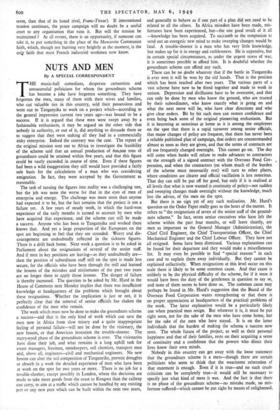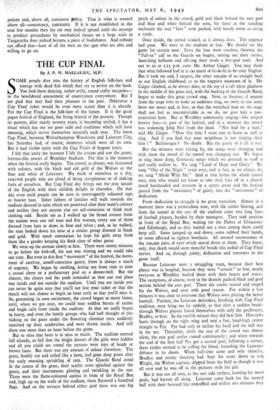NUTS AND MEN
By A SPECIAL CORRESPONDENT
HE music-hall comedians, desperate cartoonists and unsuccessful politicians for whom the groundnuts scheme has become a joke have forgotten something. They have forgotten the men, many of them with their wives and families, who cut valuable ties in this country, sold their possessions and went out to Tanganyika to work on a project which—according to the general impression current two years ago—was bound to be a success. If it is argued that these men were swept away by a fashionable enthusiasm, it may be argued on the other side that nobody in authority, or out of it, did anything to dissuade them or to suggest that they were staking all they had in a commercially risky enterprise. Indeed the contrary was the case. The report of the original mission sent out to Africa to investigate the feasibility of the scheme said that an annual production of 600,000 tons of groundnuts could be attained within five years, and that this figure could be vastly exceeded in course of time. Even if these figures had been a wild exaggeration they still would have provided a fairly safe basis for the calculations of a man who was considering emigration. In fact, they were accepted by the Government as reasonable.
The task of turning the figures into reality was a challenging one,
but the job was none the worse for that in the eyes of men of enterprise and energy. The challenge was more stern than anyone had expected it to be, but the fact remains that the project is not a failure yet. A few years of steady work, in which the hard-won experience of the early months is turned to account by men who have acquired that experience, and the scheme can still be made a success. Anyone who has been to Tanganyika and worked there knows that. And yet a large proportion of the Europeans on the spot are beginning to feel that they are stranded. Worry and dis- couragement are undoubtedly reflected in the sickness figures. There is a drift back home. Next week a question is to be asked in Parliament about the resignations of several of the senior staff. And if men in key positions are leaving—as they undoubtedly are— then the position of subordinate staff still on the spot is made less secure, for the officials who have been through the mill and learned the lessons of the mistakes and misfortunes of the past two years are no longer there to apply those lessons. The danger of failure is thereby increased. The question to be asked by Mr. Hurd in the House of Commons next Monday implies that there was insufficient knowledge at headquarters of the problems which brought about these resignations. Whether the implication is just or not, it is perfectly clear that the removal of senior officials has shaken the confidence of the men who remain.
The work which must now be done to make the groundnuts scheme a success—and that is the only kind of work which can save the men now in Africa from slow misery and a quite inappropriate feeling of personal failure—will not be done by the visionary, the new broom, or that American invention the trouble-shooter. The starry-eyed phase of the groundnuts scheme is over. The visionaries have done their job, and what remains is a long uphill task for estate managers, foremen, storekeepers, soil chemists, transport men and, above all, engineers—civil and mechanical engineers. No new broom can alter the soil composition of Tanganyika, prevent droughts or absorb in a week the detailed experience of men who have been at work on the spot for two years or more. There is no job for a trouble-shodter, except possibly in London, where the decisions are made to take more goods from the coast to Kongwa than the railway can carry, to aim at a traffic which cannot be handled by any existing port or any new port which can be built within the next two years, and generally to behave as if one part of a plan did not need to be related to all the others. In Africa mistakes have been made, mis- fortunes have been experienced, but—the one good result of it all —knowledge has been acquired. To succumb to the temptation to send out an energetic new mind to make sweeping changes would be fatal. A trouble-shooter is a man who has very little knowledge, but makes up for it in energy and ruthlessness. He is expensive, but in certain special circumstances, as under the urgent stress of war, it is sometimes possible to afford him. It is doubtful whether the groundnuts scheme can afford any such.
There can be no doubt whatever that if the battle in Tanganyika is ever won it will be won by the old hands. That is the position which has been reached after two years. The various parts of a vast scheme have now to be fitted together and made to work in unison. Depression and disillusion have to be overcome, and that can only be done by men who know the ground, who are trusted by their subordinates, who know exactly what is going on and what the next move will be, who have clear directions and who give clear orders. Bit by bit such men can restore confidence and even bring back some of the original pioneering enthusiasm. But it is becoming as notorious at home as it is among the employees on the spot that there is a rapid turnover among senior officials, that major changes of policy are frequent, that there has never been a reliable published plan of campaign, that orders are countermanded almost as soon as they are given, and that the terms of contracts are all too frequently changed overnight. This cannot go on. The day will come when banks will refuse to make advances to contractors on the strength of a signed contract with the Overseas Food Cor- poration, and when the contractors (on whom much of the burden of the scheme must necessarily rest) will turn to other places, where conditions are clearer and official vacillation is less notorious. That day can still be put off for good, but only if it is realised at all levels that what is now wanted is continuity of policy—not sudden and sweeping changes made overnight without the knowledge, much less the advice, of the men on the spot.
But there is no sign yet of any such realisation. Mr. Hurd's question on the Order Paper really goes to the heart of the matter. It refers to " the resignations of seven of the senior staff of the ground- nuts scheme." In fact, seven senior executives who have left the scheme within the past four months, or will leave shortly, are men as important as the General Manager (Administration), the Chief Civil Engineer, the Chief Transportation Officer, the Chief Mechanical Engineer and the Chief Labour Officer. They have not all resigned. Some have been dismissed. Various explanations can be found for their departure and they would make a miscellaneous list. It may even be possible to find " special reasons " in each case and to explain them away individually. But they cannot be explained collectively. When resignations at this level occur on this scale there is likely to be some common cause. And that cause is unlikely to be the physical difficulty of the scheme, for if it were it would have been the duty of the gentlemen in question to say so, and none of them seems to have done so. The common cause may perhaps be found in Mr. Hurd's suggestion that the Board of the Overseas Food Corporation wants strengthening or that there is no proper appreciation at headquarters of the practical problems of the work. The latter explanation would be a particularly likely one when practical men resign. But whatever it is, it must be put right soon, not for the sake of the men who have come home, but for the sake of the men who have stayed. It is on the latter individuals that the burden of making the scheme a. success now rests. The whole future of the project, as well as their personal happiness and that of their families, rests on their acquiring a sense of continuity and a confidence that the powers who direct their lives know their own minds.
Nobody in this country can get away with the loose statement that the groundnuts scheme is a mess—though there are certain politicians who seem to think that the wearisome reiteration of that statement is enough. Even if it is true—and no such crude criticism can be completely true—it would still be necessary to specify just what kind of mess it was. And the fact is that there is no phase of the groundnuts scheme—no mistake made, no mis- fortune suffered—which cannot be put right by means of enlightened, patient and, above "all, consistent policy. That is what is wanted above all—consistency, continuity. If it is not established in the next few months then the rot may indeed spread until the attempt to produce groundnuts by mechanical means on a large scale in Tanganyika does indeed become a piece of foolishness. And nobody can afford that—least of all the men on the spot who are able and willing to go on.







































 Previous page
Previous page